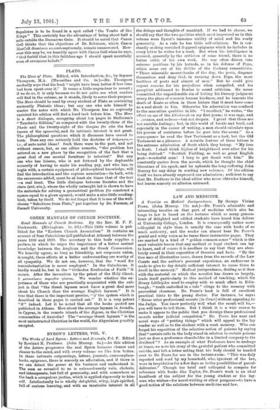BYRON'S LETTERS, VOL. V.
The Works of Lord Byron: Letters and Jcurnals, Vol. V. Edited by Rowland E. Prothero. (John Murray. 6s.)—As this edition of the Letters progresses the real Byron becomes clearer and clearer to the mind, and with every volume we like him better. In these intimate outpourings, letters, journals, commonplace- books, epigrams, there is scarcely an affectation, and if there is we can detect the poseur at his business and understand it. The man as revealed to us is extraordinarily vain, choleric. and intemperate, but full of generosity, and with somewhere at the back a scrupulous justice, which is applied rigorously to him- self. Intellectually he is wholly delightful, witty, high-spirited, full of curious learning, and with an insatiable interest in all the doings and thoughts of mankind. If we had to choose, we should say that the two qualities which mod impressed us in this volume were By ron'a immense virility of mind and his ready generosity. As a rule he has little self-criticism. He is con- stantly making wretched doggerel epigrams which he includes in every letter he writes for a week. But when his intelligence is aroused, generally by the criticism of some friend, there is no better critic of his own work. He was often driven into extreme positions by his hatreds, as in his defence of Pope, which arose out of his dislike of the Cockney romanticists. "Those miserable mountebanks of the day, the poets, disgrace themselves and deny God, in running down Pope, the most faultless of poets and almost of men." But he could give cogent reasons for his prejudices when compelled, and his pamphlet addressed to Bowles is sound criticism. He never committed the unpardonable sin of letting his literary judgment usurp the place of common human kindness, and he laments the death of Keats so often in these letters that it must have come as a real shock to him. Otherwise his admiration was confined to the masculine qualities in life. "I recollect," he writes, "the effect on me of the Edinburgh on my first poem; it was rage, and
sistance, and redress—but not despair. I grant that those are not amiable feelings ; but, in this world of bustle and broil, and especially in the career of writing, a man should calculate upon his powers of resistance before he goes into the arena." As a consequence he read the New Testament as a task, but the Old Testament as a pleasure. A notable feature of these letters is the extreme admiration of Scott which they betray. "My love to Scott. I shall think higher of knighthood ever after for his being dubbed." "Scottish Fielding, as well as great English poet—wonderful man ! I long to get drunk with him." He constantly quotes from the novels, which he thought the chief literature of his epoch, and he upbraids the long-suffering John Murray for any delay in sending new volumes. Of the edition itself we have already expressed our admiration; sufficient to say that Mr. Prothero is the ideal editor who novo: obtrudes himself, but leaves scarcely an allusion untraced.






































 Previous page
Previous page